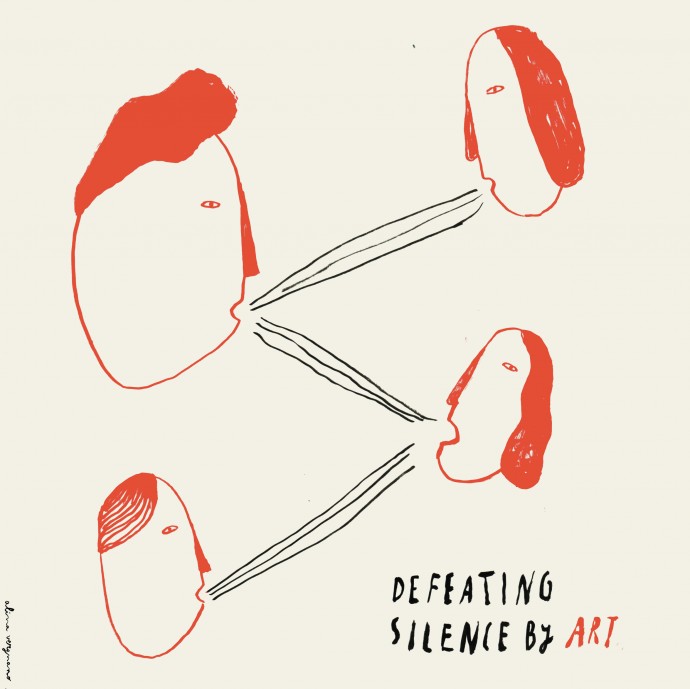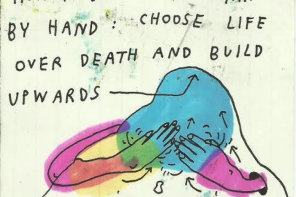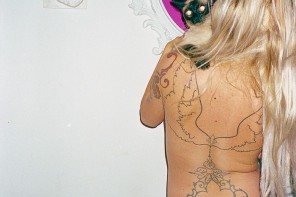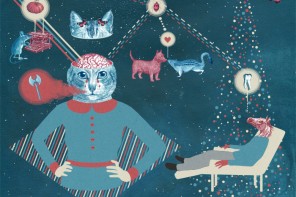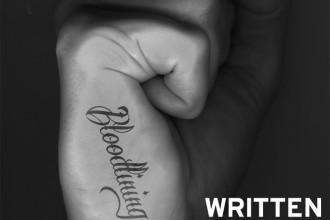Ivan Boskovic is a Berlin-based artist whose forms of expression include drawings, performances, videos and writing. He is concerned with subjects such as gender and national feelings as socially constructed categories, and through this prism he observes and analyzes politics and different bureaucratic procedures. He points out that things we often take for granted are not always as simple as they first appear to be, and stresses the importance of using all forms of self-expression available in order to defeat silence.
When I think about it, I have always seen myself as an artist, but never as a member of a group or as a part of some bigger social constellation. My sole intention was to remain free or stay as close as possible to freedom. I would describe my beginnings as a randomness, lacking any order. I started studying literature while also acting in theatre scene in Belgrade. I was also drawing a lot, but my first drawings were mostly used as culise, a setting for my performance. It is only now, after many years that I can say that they became completely autonomous. I wasn’t planning on Berlin at all. I performed in a festival here and met Professor Katharina Sieverding at UDK. I joined her class and started dealing with the process of creating art and dealing with it, without focusing on a particular sphere. However, I don’t think that education is particularly relevant, since there is no way of determining what excellent art is and how to grade it. The only thing that matters is how you appear, because nobody will go around searching for you because you are an excellent artist. You have to present yourself.
For six years I have been performing together with Marija Stankovic, a painter and a friend of mine. Two of us, along with two other friends, formed the AGB group Ausgenderbehoerde which is a wordplay for the German Office for Foreigners. We are exploring polarity in general – us and the others, male and female, and so on. As a platform for this we’ve been using bureaucracy. We became an imagined office, our main goal being to interact with people. We lead our audience through normal bureaucratic procedures, which are being ridiculed and banalised. OSTRALE’O13 in Dresden will be the seventh time that I will be doing Erde für die Zukunft, or “Soil for the Future”; I’ve already performed several times in Berlin, Tel Aviv and Belgrade. The next one in Berlin will probably happen in October. The performance is imagined as something on the edge between esoteric séance and a visit to a shrink. People are given forms and we start a numerological game. During the performance they will be required to fill in the form with numbers of their choice, according to which they will later receive three nationalities – their former, current and future nationality and then I wait and record their reactions. My intention is to catch individual feelings for their own nationality, but also their perception of other nationalities. For example, suddenly you become French or Korean, and you find yourself feeling disappointment or enthusiastic, something which you are not able to explain. Here it already becomes obvious to which extent the whole concept is actually artificial and constructed. People get surprised by their own reactions. I keep in touch with the participants afterwards and send them back the official piece of writing which will inform them of their new nationalities and its elements (this can be practically anything, a telephone for example). This all goes to a database of people, nationalities and emotional responses which I am currently creating. I expect this to be a big project and therefore it is important that I have as many performances as possible.
The performance Erde für die Zukunft tackles the subject of national feelings and how you don’t even notice that you become your nationality. I find this very interesting, since I am coming from ex-Yugoslavia and I went through the change of nationality as early as at the age of 10. All of a sudden I found myself becoming somebody else, becoming aware for the first time of these differences, but also of their abstractness. The whole idea of a system pushing individuals into certain national codes and opening the possibility of one losing one’s individuality is very interesting to me. We live in a colorful world and we all carry along different things with ourselves. These differences in the socio-political discourse are the nationalities.
The special accent in the performances is placed on my drawings, which are mostly focused on the idea of localizing oneself. I draw maps which represent the world that does not exist, but which still capture some geo-political relations. They contain recognisable elements, such as the language of maps, lines that connect cities, but at the end they don’t give any information. On the paper everything seems clear, when in reality it is not. Maps remain abstract. Therefore the ones that I draw are totally invented and the process itself is very random. Firstly, I am doing the allocation of land and only at the end am I positioning points, using real countries and cities. For example, I placed New York and Tokyo in the same country. Despite the existence of cultures and languages, maps remain very plastic and artificial.
In addition to this, I included the theme of gender into my performances spontaneously. I experimented with ecriture feminine, which in my case stood for finding yourself and re-discovering the language. I was therefore writing from the female perspective, since you don’t need to be a woman in order to write as one. You don’t even have to be aware of your body and sexuallity, even of your expectations from the other gender in order to project yourself into this role. I probably absorbed this style through reading and then just began giving it back, never really questioning myself about it. I see it as a journey and a way of achieving freedom. And it is freedom, this process of being able to just switch between genders whenever you feel like it, and it can help you to express yourself within your artfield. The idea grew into something bigger and I started dealing with women in power and about how women deal with the situations in high-politics. I would say that this subject is quite exotic, especially since I believe that they are handling politics much better.
In general, politics is a very important subject and just needs to be approached in another way. For this reason I would like to address the generation which is generally not interested in it, the young people, who are completely bored even by the idea of democracy. I don’t propose that artists and those who consume art should be politically active, since you don’t have to be anything, but it is certainly a subject to be dealt with within the arts. We need our agency within the society and not necessarily a real goal at the beginning. Just to participate and anticipate. Be present at any level of this society and then transform the experience into art of any kind. I see it as one form of language available for self-expression and I am using it, otherwise I would be mute.

